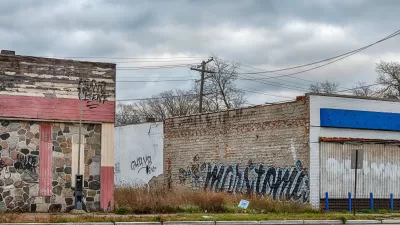Detroit's comeback has been well documented, as has its efforts to remove blight and demolish vacant properties. A new report sheds light on another of the city's deepest challenges: how to reform property taxes to achieve fiscal certainty.
"Detroit is still hindered in its recovery by structural flaws in its property tax system," according to a new report published by the Lincoln Institute of Land Policy.
A post on the Lincoln Institute's blog introduces the study, which details the multiple stresses on the city's fiscal system associated with property tax system, including high property tax rates, delinquencies, inaccurate assessments, overuse of tax breaks, and limitations imposed by the Michigan constitution and state statutes.
The report, titled Detroit and the Property Tax: Strategies to Improve Equity and Enhance Revenue and written by Gary Sands, Wayne State University professor emeritus of urban planning, also provides five suggestions for reforming Detroit's property tax system, which are informative for other post-industrial cities struggling to achieve fiscal balance. The reports suggested reforms:
- Continue to improve assessments
- Improve the targeting of tax abatements
- Implement a land-based tax
- Eliminate the state's taxable-value cap
- Reduce statutory tax rates
Christine MacDonald picked up the news of the report, providing coverage for The Detroit News. The article focuses mostly on the imbalance of tax breaks for businesses and the highest tax rates of any major city in the country for individual property owners.
FULL STORY: Detroit’s Property Tax: Averting Another Disaster

Planetizen Federal Action Tracker
A weekly monitor of how Trump’s orders and actions are impacting planners and planning in America.

Vehicle-related Deaths Drop 29% in Richmond, VA
The seventh year of the city's Vision Zero strategy also cut the number of people killed in alcohol-related crashes by half.

As Trump Phases Out FEMA, Is It Time to Flee the Floodplains?
With less federal funding available for disaster relief efforts, the need to relocate at-risk communities is more urgent than ever.

More Apartments Are Being Built in Less-Dense Areas
Rising housing costs in urban cores and a demand for rental housing is driving more multifamily development to exurbs and small metros.

Plastic Bag Bans Actually Worked
U.S. coastal areas with plastic bag bans or fees saw significant reductions in plastic bag pollution — but plastic waste as a whole is growing.

Improving Indoor Air Quality, One Block at a Time
A movement to switch to electric appliances at the neighborhood scale is taking off in California.
Urban Design for Planners 1: Software Tools
This six-course series explores essential urban design concepts using open source software and equips planners with the tools they need to participate fully in the urban design process.
Planning for Universal Design
Learn the tools for implementing Universal Design in planning regulations.
Borough of Carlisle
Smith Gee Studio
City of Camden Redevelopment Agency
City of Astoria
Transportation Research & Education Center (TREC) at Portland State University
Camden Redevelopment Agency
City of Claremont
Municipality of Princeton (NJ)




























